Peter MALONE
Saturday, 18 September 2021 19:30
Hors La Vie / Hold Onto Life
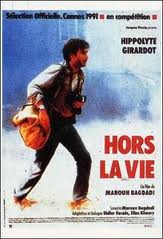
HORS LA VIE (HOLD ONTO LIFE)
Lebanon/France, 1991, 97 minutes, Colour.
Hippolyte Girardot, Rafic Ali Ahmad.
Directed by Maroun Bagdadi.
Hors La Vie (Hold Onto Life) is a vigorous Lebanese-French? co-production, written and directed by Mahoune Bagdadi. (Unfortunately, after the completion of the film, Bagdadi died accidentally from a fall into a liftwell.)
The film is based on a memoir of a French photojournalist and his being a hostage for over 300 days in Lebanon. He is presented as an ambitious journalist, young and inexperienced in the ways of Lebanese armies, suffering the humiliation and indignities of his captivity, the uncertainties, the attempts to escape, the support of some of his captors? On the whole, he is seen generally in isolation or with his captors.
The film also offers a portrait of Lebanese terrorists, their ordinary lives, the motives for their taking hostages, their treatment of the hostage.
The film has an authentic and gritty touch, is very physical in many of its sequences, making the audience share the hostage experience of the central character.
A strong document of the '90s, a fiction that brings home to audience the impact of fact.
1.A passionate film, Lebanese background, Arab sensibility, French techniques and collaboration? The perspective of the Lebanese film-maker?
2.The title, the hero being out of his ordinary life, holding onto life, the hostage experience?
3.The use of Beirut locations, the war torn and bombed exteriors, the buildings and the streets, the interiors, the homes? The atmosphere of a war torn city? Its atmosphere? Lebanese television, music? The musical score? The subjective style and hand-held camera techniques?
4.The audience and sympathies for the Lebanese situation, sympathy for the Lebanese themselves, for terrorists? For foreign hostages? The impact of the bombed city? The violence, the factions in the city, the taking hostages, hostages as bargaining points?
5.The portrait of Patrick in the war situation, the journalist, his eagerness in taking photographs, the dangerous situations, his wanting interviews? His being seen as a foreign imperialist?
6.The drama of his being taken in the street, held in the car, his initial fear, the ways of transferring him from cars to buildings, the blindfold, the violent treatment? The impact of not seeing, not knowing, the accumulating fear?
7.The detail of the hostage experience, the places of imprisonment, the cars, the dark and the candles, the locked doors, the locked windows? The possibilities of washing and the humiliation, lavatory experience, the pyjamas, the quality of the food, the decision to go on a hunger strike, the pangs of hunger, the need for candles? Illness and treatment?
8.The people taking the hostages: the man in charge and his overall command, Felipe and his friendliness, the exchange of names, Patrick teaching him? The mercenary and his violent and gung-ho, manic behaviour? The humour in the American Lebanese who had been in Hollywood, an extra in Taxi Driver, imitating Robert de Niro? The range of the other captors? Communication, hopes, hopes dashed, fears created by lies?
9.His being kept in the house, the family, the child wandering into his room, the mother and her gratitude towards Patrick for his help?
10.The passing of time, the loss of sense of time, the overwhelming experience, the growing bewilderment? His being wrapped in sticky paper and taken under the truck? The sequences of his illness? Opening the window, getting the key and wandering the house? The repercussions?
11.The war issues, the desire for exchange of prisoners, Patrick not knowing these issues?
12.His wanting to get out, the false getting out? Finally released, wandering the beach, doffing the Arab clothing, going to the hotel, the reception of the journalists - his being back in his own world?
13.The dependence on Isabelle, her photo on the wall, keeping in touch with reality, the emotional dependence and longing? The tearing up of the photo?
14.Patrick back in his own world, the cafe, discussions with his friends, with Isabelle? His having taken the phone number, ringing the phone - and the empty house and no answer at the end? Symbol of the hostilities in Lebanon?
Published in Movie Reviews
Published in
Movie Reviews
Tagged under
Saturday, 18 September 2021 19:30
Horizons West

HORIZONS WEST
US, 1952, 81 minutes, Colour.
Rock Hudson, Robert Ryan, Julia Adams, John Mc Intyre, Raymond Burr, Dennis Weaver.
Directed by Budd Boetticher.
Horizons West is a very entertaining Western, directed by Budd Boetticher, prolific at this kind of film and an expert director of Westerns (especially those in the 50's with Randolph Scott).
The film is a typical short-running feature from Universal Studios of the 50's. They highlighted characters and plot - and still stand up quite entertainingly in later decades.
Robert Ryan is a strong star and, usually, a villain. Here he is matched by young Rock Hudson early in his career as the upstanding hero. Julia Adams has a variation on her heroine role as a femme fatale. Several actors who were to emerge on screen and on television appear in typical enough roles: Raymond Burr as the sadistic heavy, James Arness as the genial Western rancher, Denis Weaver as the assistant with the deserters from the Civil War. John McIntyre? appears, as so frequently, as a rancher and a parent.
The film has a post Civil War setting, the disruptions in Texas after the war with the carpet baggers from the north, the absence of the Texas rangers, the building up of the cattle industry, rustling and the opening up of the railroad - as well as showing the corruption and money-making in the period.
1.Interesting and entertaining western? Texas? The aftermath of the Civil War? Law and order?
2.The Texas settings, the open plains, the city of Boston?
Action sequences? Musical score?
3.The archetypical title and the focus on the West? The vision of the west? The work of Bud Boetticher and his perceptive westerns.
4.The Civil War and its effect? The north and its coming into the south to make money? The defeated southerners, wanting to resume their lives, unsettled by the War, wanting to make money? Breaking the law? The confrontation within families?
5.Dan Hammond, a major, the experience of the War? Older brother, unsettled? Wanting to make money? The attraction of Mrs. Carden, getting the money from his friend, the poker game, the clash with Carden? His decision to go to the outlaws, the fight, Dandy and his support? The cattle rustling? The making of money? The Mexicans in the Zona Libre? Paying off his father's debt? The clash with Carden? The attraction to his wife? Business deals, law and order? Using the documentation, the coming of the railroad? His suave manner, his double life? The death of the authority before he went to Washington? His being taken, wanting security, the lynching parties? Neil putting him in the prison, in the crypt - and his killing of Tiny? The escape, Zona Libre, Mrs. Carden coming to him? His father wanting to take him back, the confrontation with Neil, his father as hostage? The shooting and his death?
6.Neil, the upright younger brother, family, attracted to Sal? Working with his parents? The anniversary party? Finding out the truth, confronting Dan? Law and order, taking on the office? Wanting his brother to be tried, the escape, the final confrontation? The happy ending and the ranch?
7.Harden, the northerner, sadistic with his wife, the deals, gambling? Torturing Neil? Confrontation with Dan and his death? His henchman?
8.Tiny, genial, his family? The good man of the West? Guarding Dan, asking him the questions, shot?
9.Ira and his wife, ranchers? Paying off the debts? Glad to have the family home? Neil and his devotion, the pain of Dan's behaviour, law and order? Ira going to get his son?
10.The authorities, helping Dan with his money? Seeing him break the law, the confrontation, the attempt to get Federal help? The murder? The corrupt judges and marshal? Informants?
11.Dandy, the experience of the War, the deserters, the wild behaviour, outlaws, the fights? Organized with Dan, the cattle rustling? The shoot-outs?
12.Themes of the Civil War and its aftermath, a new United States, the opening up of Texas, law and order, money makers? The romance and heroism of the West?
Published in Movie Reviews
Published in
Movie Reviews
Tagged under
Saturday, 18 September 2021 19:30
Honeymoon in Vegas
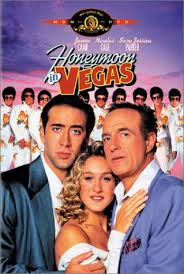
HONEYMOON IN VEGAS
US, 1992, 96 minutes, Colour.
Nicolas Cage, James Caan, Sarah Jessica Parker, Anne Bancroft, Peter Boyle, Pat Morita.
Directed by Andrew Bergman,
Honeymoon in Vegas is a screwball comedy, '90s style. It was written and directed by Andrew Bergman, writer and/or director of such films as Blazing Saddles, The In- Laws, So Fine. It has the raucous touch as well as relying on the traditions of the screwball comedy.
Nicholas Cage does his best in a zany comedy role and has the chance to imitate Elvis (which he did in a different style in Wild at Heart). Sarah Jessica Parker is the put-upon heroine. James Caan is a self-centred gambler thug. The supporting cast includes Pat Morita, Peter Boyle (fairly well disguised as Chief on Hawaii) and a moment from Anne Bancroft as Nicholas Cage's demanding mother.
The film was popular in the United States - it seems rather loud and raucous for comedy styles for other cultures. It also echoes the permissive styles of the '90s (and has a lot in common with Adrian Lyons' Indecent Proposal).
1.The continued popularity of screwball comedies? Their zany characters and styles? Heroines on the run? The touch of the gangster? Adapted for the '90s? The characters, situations, glitzy style, issues?
2.The film and the Las Vegas glitter, the contrast with Hawaii? The locations and their atmosphere? Action sequences - especially with the Flying Elvis Troupe?
3.Elvis alive! Elvis as King! The popularity of Elvis, the humorous collage of impersonations (range and race)? The Flying Elvis Troupe? The use of Presley songs, the range of singers and their renditions?
4.Jack Singer, hero, as a type hero from an Elvis Presley movie of the past, and finally impersonating him?
5.Jack, his work, lack of success? The intensity of his mother warning him never to marry? His love for Betsy, making a decision, proposing to get married in Las Vegas?
6.Betsy, her love for Jack - and her wariness of Jack's mother? Her wanting a white Las Vegas wedding? Dressed in white throughout the film?
7.Tommy Korman, the professional gambler, his entourage? The memories of his dead wife - and Sarah Jessica Parker playing this role? His image of his wife in seeing Betsy? The poker game with Jack, stacking the cards, winning, having Jack in debt, the proposal?
8.Jack and Betsy and the proposal, his worry, Betsy's reaction? Her exasperation, going with Tommy, her motivation?
9.Hawaii, Tommy and his style, wooing her? Betsy and her reaction? The luxury accommodation? The sexual proposal and her reaction? Walking in the mountains - with the touch of slapstick with Tommy falling down the hole...?
10.Jack the investigator, tracking Tommy down, going to Hawaii, the difficulties in locating Betsy? Getting help from Mahi? The driving, the advice? The visit to the Chief? The henchmen protecting Tommy?
11.The effect of the experience on Betsy, the return to Las Vegas?
12.Jack wanting to get back, the Flying Elvis Troupe, in the plane, the free-fall - and the humour on Elvis?
13.The finale, Betsy and the chorus, Jack as Elvis, the landing, Tommy as villain, the chase - and the wedding?
14.The brash and loud humour? The moral of the story?
Published in Movie Reviews
Published in
Movie Reviews
Tagged under
Saturday, 18 September 2021 19:30
Holy Smoke
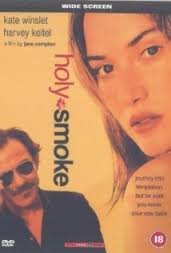
HOLY SMOKE
Australia, 1999, 114 minutes, Colour.
Kate Winslett, Harvey Keitel, Julie Hamilton, Pam Greer, Sophie Lee, Paul Goddard, Tim Robertson.
Directed by Jane Campion.
Holy Smoke is a return by writer-director Jane Campion to her black satiric style of her short films of the '80s and of Sweetie (1989). While there were these elements in The Piano and Portrait of a Lady, they are to the fore in this story, co-written with her sister Anna Campion, of a young woman from Sydney seeking spiritual enlightenment and finding it in India. However, in India she falls under the spell of a guru, abandoning family, her name, dress...
However, the family (portrayed in an ultra ocker way) are concerned and employ P.J. Waters, the alleged expert on deprogramming from the United States (Harvey Keitel). Later, his assistant (Pam Greer) arrives.
The film shows the confrontation between Winslett and Keitel, making Keitel seem a phoney like the guru in his breaking the boundaries in a sexual relationship with his client. Winslett excellently portrays the confused young woman, both insecure and seductive, the interaction of religion and sexuality in her search. Julie Hamilton is very good as the mother, Sophie Lee exaggerates (as what she calls in the production notes a "dingbat") as Winslett's sister-in-law.
While the film is critical of fashionable gurus and phoney conversions, it actually shows, for a younger generation, the actual searches that took place since the '60s in such countries as India for spiritual enlightenment.
1.The work of Jane Campion, her classics, her early work, satire and black comedy? The collaboration of her sister? The discussions with young people on their search for spirituality and enlightenment in India?
2.The title and its tone, serious and flippant? Suitable for the whole film?
3.The location photography in India, Delhi, its atmosphere? The contrast with the neat laid-out suburbs of San Souci? The contrast again with the Outback and the use of the Flinders Ranges dwarfing the characters in a magnificent desert environment? The musical score, the range of songs? Blend of East and West?
4.The Indian experience for young Australians, for young people from all over the world? Their age, experience, not settling, wanting to search? The westerners in Asia? A young girl, the trek, the atmosphere of the group, the peer pressure, egging each other on, the search? The charm of the guru, his mystique? Taking the promises personally, the love of the guru, the bride of the guru? Talk of universal love? Ruth adopting sari and Hindu names? Genuine and phoney? Her inability to see through the guru? The visualising of rituals and paraphernalia and their effect? The contrast between Ruth and Prue? The audience response to this Indian sequence and their own sympathies and antipathies towards gurus? Towards young people seeking such enlightenment?
5.Prue's arrival in Australia, scared, terrifying the family? Ruth's mother and her concern, her narrow Australian perspective, xenophobic, wondering about India, strange religions? Dad and his casual approach, in the house in his underpants - and later revelation of his behaviour with his secretary? The introduction to the rest of the family, the brother and his "dingbat" wife? Tim and his gay friend? How authentic a family, dysfunctional, caricatured?
6.The reaction to Prue and her story? Stan and his friendship, his spiel about deprogramming and the experts from America? Persuasive with the family, their decision about the money? The decision for Mum to go to India and bring Ruth home, the lie about her father's dying?
7.Mum in India, in an alien experience, the crowds, the dust and the dirt, the different ways of doing things, her observations? Meeting Ruth and her dismay? Her friends? Lying about Dad? Her being persuaded to look at the guru and her collapsing and being taken back home? Ruth accompanying her?
8.P.J. Walker and Harvey Keitel's performance, his arrival in Australia, his thinking himself above people, his own phoniness and spiels, yet his skills? Reaction to all the family, Yvonne and her approaches, Robbie and the security? His meeting Ruth, the initial attraction and antagonism? Travelling to the Outback?
9.Cate Winslett's presence and style as Ruth? Her reaction to the family, to P.J? Her insecurity yet hopes, her defensiveness? Her discovery of her father playing golf and her disillusionment? The support of the family, including Aunt Puss?
10.The drama of the confrontation between P.J. and Ruth? His speech to her, the conditions, the deal? The details of their interaction, the statistics of deprogramming? The isolation in the hut, their interactions, the program and the method, its structure? Ruth not keeping to it? Her hostility, adverse reaction to P.J., comments on his dyed hair and phoniness? Signalling help with the stones? The phone calls, the talk? Her understanding of the experience in India, explaining it? The value of P.J's insights, his own insecurity, experience? Sex and religion? Who was seductive? P.J. and his stating the boundaries, breaking them?
11.P.J. and the effect of breaking the boundaries, the sexual encounter, affection, love? The cover-up with the rest of the family, with Carol? The continued interactions? P.J. becoming as phoney as the guru in India? His allowing the outing to the pub, the fights, the drinking? The sexual encounter and Ruth making him put on the red dress, the effect on him, masculinity, macho attitudes, the feminine? The chase in the desert? Ruth and the collapse of her framework? Relating to the family?
12.Carol and her arrival, skills, help, confronting P.J? Her finally contributing to the deprogramming?
13.The sketch of the family, Yvonne and her sexual repression, her eccentricity, naivety? Robbie and his wanting to do the security, his own insecurity? Tim and his not being able to help?
14.What happened to Ruth, the experience, for her future? What happened to P.J., the breaking down of his self and expectations?
15.The aftermath and Ruth and her mother going to India, the father leaving, P.J. going back to America, Carol and the twins? The letters? The future?
16.Themes of the search for religion and spirituality? God and beyond? Relationships and needs? Advisers and their boundaries? Sexuality and religion? Solutions and no solutions?
Published in Movie Reviews
Published in
Movie Reviews
Tagged under
Saturday, 18 September 2021 19:30
H.M.Pulham Esquire

H.M. PULHAM ESQUIRE
US, 1940, 120 minutes, Black and white.
Robert Young, Ruth Hussey, Hedy Lamarr, Charles Coburn, Van Heflin, Fay Holden, Bonita Granville.
Directed by King Vidor.
H.M. Pulham Esquire is based on a novel by J.P. Marquand (The Late George Apley, the Mr Moto series). It was co-written by its director, King Vidor, a veteran moviemaker from silent days with The Big Parade to pieces of Americana like Northwest Passage and Wilson, an American tragedy, during the '40s. He made quite a number of melodramatic movies including Bette Davis's famous Beyond the Forest. In his later career he made such spectacles as War and Peace and Solomon and Sheba.
The film has an aristocratic Boston setting and contrasts it with the world of New York. The action takes place over the early decades of the 20th century, changing traditions and attitudes. Robert Young suits the part of Harry Pulham, the Boston man, experiencing action in World War One, working in an advertising agency in New York, but still going back to his roots in Boston. Hedy Lamarr is the woman in his life, working in the agency - but her own woman and unable to give in to the demands of Harry Pulham. Ruth Hussey is his wife. The supporting cast includes Van Heflin and Charles Coburn.
While the material is dated, reflects the styles of the early '40s (especially in the reconciliation of the marriage), it is the material that still fascinates, the material of the past, interpretations of the American way of life, its formality and respectability, the possibilities of breaking free.
1.Entertaining drama? MGM '40s style?
2.The writings of J.P. Marquand and his popularity, the re creation of Boston wealthy society, the contrast with New York? A piece of Americana? The work of King Vidor?
3.Black and white photography, MGM glossy production style, the strong cast, Bronislau Kaper's musical score?
4.The title and its tone, aristocratic Boston, stuffiness, the contrast with New York? The focus on human nature and personal crises?
5.The structure of the film: the focus on Pulham, his regular life, wife and family, work, secretary? The interruption of the invitation to dinner, his college friend, the reunion? The phone call from Marvin? The possibility of remembering and reassessing his life? The intercutting of the flashbacks?
6.His memories: the birth, his father being proud, his going to school, the principal and the injury? Football? The strictness of his father and his moral exhortations? Harvard, Joe and Bill, the football talk, the ethos of football at college? Young, earnest? His relationship with his parents, distance from his father, his aristocratic mother? Mary as the tomboy? The bond between brother and sister? The memory of the dance at school with Kay, her visits, the meals? The family and society expectations of him?
7.His experience of the war, the group not surrendering, the interchange with the Germans? Its effect on his life, his return?
8.Friendship with Bill, the decision not to return to Boston, going to work for the advertising company, the campaign about the soap? His meeting Marvin, attracted to her? Their working together, going to the home, the washing and the soap? Falling in love, their life together, plans, New York style? The visit to Boston - Marvin finding it stuffy, the outings in the snow, the sled? Harry and his concern about Marvin - meeting Mary, the interview with his mother? His father, the demands? The expectations for the firm, success in life? His death, the funeral, Harry as executor? His experience of people confronting one another - and his decision to do the same with Marvin?
9.Hedy Lamarr as Marvin, her background, migrating to the United States? Her story of poverty? Hard work, success in the firm? Attracted to Harry, in love? The washing sequence? Going to Boston, finding it stuffy, the interview with Harry's mother? Her wanting to stay in New York, his wanting to stay in Boston? The confrontation, their discussions, her love - but unable to fulfil his conditions?
10.Kay and Joe, their engagement? Kay's attraction to Bill, his being with her, not proposing? Kay and the breaking of the engagement, Bill's going away? Together with Harry in the boat, the reflections of their lives, directions, going together? The formal marriage and the focus on the ceremony - formality instead of love? The passing of 20 years? Their daughter? The domestic scenes?
11.Harry's not seeing Marvin for 20 years, the phone call, going to the hotel, refusing to go in, sending her the flowers? The phone call, the meeting? Talking over what had happened to them? Her story of her husband? Her skills in business, the phone call? Their discussion about love, marriage - and going their separate ways?
12.The portrait of the Pulham family, their hold over each other? The Boston experience, the home, the holiday house? All the memories closing in and clutching at the members of the family? The mother and her moods, elegance? The father and his age, demands? Mary and her wanting to break out, yet demanding that Harry stay? Kay within this background? The opening with Harry so regular and indicating the theme of his life?
13.The contrast with New York, the advertising firm? Bill contrasting with Joe and the other young men at college? The football champion - and his organising the reunion? His speech, memories? Joe and his friendship with Harry, disappointment in his engagement being broken? Bill as thinking differently, friendship with Harry, their work in the firm? His visits?
14.The film as a piece of Americana, a glimpse of American expectations for wealthy and middle America in the early part of the 20th century?
Published in Movie Reviews
Published in
Movie Reviews
Tagged under
Saturday, 18 September 2021 19:30
His Master's Ghost
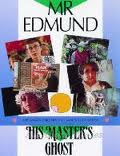
HIS MASTER'S GHOST
Australia, 1990, 50 minutes, Colour.
Simon Grey, Jonathan Hardy, Josephine Byrnes.
Directed by Steve Joddrell.
His Master's Ghost is one of the More Winners series, produced by the Australian Children's Television Foundation. It follows on the success of the Winners series.
This is a pleasant ghost story, a story about young musicians at a camp (filmed at Melbourne's Montsalvat community). There is the cheeky boy, there are the rough diamonds, there is the boy genius, there are the girls and their performances. It is a pleasant interaction amongst young teenagers. However, the gardener bears something of a resemblance to Beethoven - and there are legends about him. It seems he is Beethoven's ghost. With his powers he enables the children to achieve their potential - especially the young hero and his affirming himself, the heroine and her ability to play the violin, the boy genius who writes most complicated music, and the band is able to perform it. Jonathan Hardy enjoys himself as Beethoven's ghost.
1.Enjoyable children's film? About children, for children? Children's issues?
2.The Montsalvat settings, the artistic colony, the buildings - with the suggestion of castles and corridors, of ghosts? The music, performance, classics, popular music, the complex composition?
3.The focus on Flea: at the camp, family background, friendships, age and development? Music? Picked on, getting into mischief? Relationship with the staff? The gardener? Discovering the ghost, prowling the corridors? Friendship with the violinist? The discovery, Jason and his playing, the influence of the ghost? The change by the end of the music camp?
4.Jason, the boy genius, isolating himself from the rest, being picked on? Friendship with Flea? With the girls? The attitudes of the staff, the scepticism by the conductor? The decision for using his music? The rehearsals, the cacophony? The gardener and his empowering the violinist? Success? Conducting his own music? Achievement?
5.The girls, relationship with the boys, mischief and games, rehearsals, the music? The girl and her violin-playing, the complex music, empowered by the ghost, sense of achievement?
6.Bretherton as gardener, sinister-seeming, a ghost, the legends about him, Beethoven? Watching the children, prowling the corridors, giving them frights, enjoying the mischief? Helping them to achieve their ambitions?
7.The staff and their concern: the woman and her organisation of the camp, concern about the children, management? The lecturer and his scepticism? His helping the children? The conductor, his position in the group? His unwillingness to conduct the music? His change of heart? The older teacher and concern for the students?
8.An enjoyable story, the focus on children, the atmospherics of the ghost story?
Published in Movie Reviews
Published in
Movie Reviews
Tagged under
Saturday, 18 September 2021 19:30
Hit Man
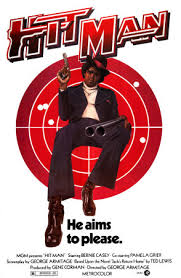
HIT MAN
US, 1972, 90 minutes, Colour.
Bernie Casey, Pam Grier, Roger Mosely.
Directed by George Armitage.
Hit Man is a thriller of the early '70s, the period of what have come to be called `blaxploitation' movies. Bernie Casey was the star of a number of these films. Included in the cast are Pam Greer and Roger Mosely. The writer-director is George Armitage, who made such films as Gas and later, the very effective Miami Blues. This film is a reworking of Mike Hodges' Get Carter.
The film is a mixture of action - with Bernie Casey as a hit man coming back into town to try to investigate the murder of his brother. He encounters a range of characters from prostitutes to actors in pornographic films, owners of bars, studios, companies. The film intermingles a fair amount of violence with some more explicit sex from the period.
There is very little interest in characterisation - the characters are all the expected stereotypes. The interactions are minimal - questions and answers, posings and postures of a violent and sexual kind, the vocabulary of the black American street people.
All this combines to make a basic kind of action feature - but it seems, in retrospect, to be very much of its time and seems now dated.
Published in Movie Reviews
Published in
Movie Reviews
Tagged under
Saturday, 18 September 2021 19:30
Hired Wife
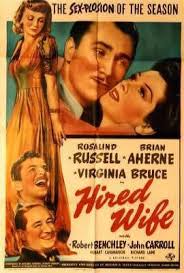
HIRED WIFE
US, 1940, 96 minutes, Black and White.
Rosalind Russell, Brian Aherne, Virginia Bruce, Robert Benchley, John Carroll.
Directed by William A. Seiter.
Hired Wife is a star vehicle for Rosalind Russell. It is one of those screwball comedies of the late '30s and early '40s which were so popular - the professional woman, the battle of the sexes. Rosalind Russell walks through this kind of film with great authority. Brian Aherne is the gentlemanly businessman. Virginia Bruce has glamour, John Carroll impersonates an Argentinian playboy and Robert Benchley is there for some extra comedy.
The film reflects the attitudes and the entertainment values of the period.
1.Enjoyable comedy? Americana? Battle of the sexes? The tradition of the screwball comedies?
2.Black and white photography, New York settings, the world of business? Musical score?
3.The title, the implications? The humour?
4.Kendall as the professional businesswoman, the efficient secretary? Her friendship with Jose? His previous proposals? Her devotion to Steven? His work, her work? His wanting Phyllis for the advertising campaign, her reaction, double-dealings - and it all coming back on her? Steven's need to get a wife for business matters? Her interview with Phyllis and Phyllis's refusal? Her stepping in, her making demands, paying Jose to court Phyllis? The mix-ups? The possibility of an annulment? The final realisation of who loved whom?
5.Steven, the austere businessman, his work, cement, advertising, bankruptcy, needing to marry? His courting of Phyllis and outings with her? His marrying Kendall? His devotion to Phyllis, the gradual realisation of what Kendall had done, in love with her?
6.Phyllis, glamour, advertising? Flattered by Steven, out with him? Clashing with Kendall? The dinner with Jose, attracted to him? The final resolution? Jose as the stereotype of the South American, acting as playboy, his attractiveness to Phyllis? The final resolution?
7.Van Horne, his financial advice, legal advice? His help with the marriage, annulment? The business associates and their pressure on Steven?
8.Situations, humorous lines, ironies? Status of men and women in the early '40s? Battle of the sexes?
Published in Movie Reviews
Published in
Movie Reviews
Tagged under
Saturday, 18 September 2021 19:30
High Desert Kill
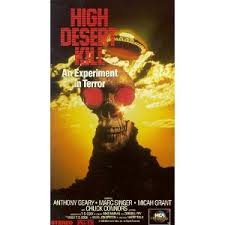
HIGH DESERT KILL
US, 1990, 93 minutes, Colour.
Chuck Connors, Marc Singer, Anthony Geary.
Directed by Harry Falk.
High Desert Kill is an action thriller made for cable television. It shows a group of hunters in the High Sierras. However, the film takes on tones of science fiction as one of the friends of the hunters, killed previously in an accident, materialises and treats the hunters as if they were experimental animals, trying to control their behaviour. While the plot strains credibility, the suspense and tension build up to give it some kind of plausibility. The film takes the themes of American buddies, the macho image - and offers some critique via the science fiction theme.
1.Interesting and entertaining telemovie? Men identifying with the macho hunters? The presentation of American men in this situation - and the critique via science fiction themes?
2.The mountain country and its beauty, wild life? Its becoming sinister? The special effects for the alien viewing the humans? The action sequences? The musical score?
3.The title, the location, the hunting and the hunters becoming the hunted?
4.The setting with Jim, the scientist, laboratory experiments (and the irony that he was to become a victim of such an experiment)? Brad and his machines, the man-about-town, his work? Ray, the male model, his commercials work? The memory of Paul and his death in the accident? The photos? The tradition of the men going off to hunt? Not necessarily liking each other but buddies?
5.The meeting with Stan, Chuck Connors as the old man of the mountains? The ordinary hunting themes, travel in the mountains, stalking the wildlife? The talk between the men, the memories of Paul? Strains on friendship? Discussions about hunting and the destruction of animals?
6.The encounter with the two young women? The peculiar behaviour - their imposing themselves on the men? The sexual encounter? The fight between Stan and Ray? Brad and the women? Jim not seeing them? The aftermath, their message? One girl killing herself? The other disappearing?
7.The odd behaviour of the men, their being taken over, the hunting of the bear, devouring the bear? The anger amongst themselves? Their fears? The passing of time, falling asleep? Brad and his going for help, the confrontation with the vehicle? Brad's death?
8.The audience aware that the aliens were watching the group? Altering their behaviour? The going to the headquarters, the Indian background? The finding of the bodies, of the car? The mystery of the human experiments?
9.The materialising of Paul? Their ability to change him with their imaginations and stories? The confrontation and imagining his destruction?
10.The character of Jim, the scientist, the friend, the hunter, his disgust at his behaviour? The fears and the confrontation with Paul? Brad, brashness, alone, dead? His final reappearance? Ray, the young man, not wanting to go hunting, the memory of his uncle? The clash with the two older men? His using his imagination to control his uncle? Stan as the grizzled old man, drinking, the women, fears? Prepared to die for the others?
13.Interesting action adventure, science and science fiction themes?
Published in Movie Reviews
Published in
Movie Reviews
Tagged under
Saturday, 18 September 2021 19:30
High Boot Benny
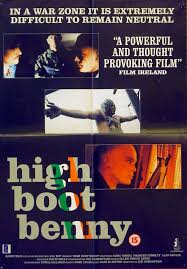
HIGH BOOT BENNY
Ireland, 1994, 78 minutes, Colour.
Marc O'Shea, Frances Tomelty.
Directed by Joe Commerford.
High Boot Benny is an Irish film about the relationships between north and south. Filmed in Donegal, on the border, it focuses on a school for Protestants run by a matron and a former priest. Benny is a young teenager, seemingly an orphan, who studies at the school but gets into trouble, with the local authorities and with the army from the north. The film is a portrait of the harsh life in this town, the children at the school, the parish priest, the army, traitors and informers, the continual violence and death. The film focuses on people, the background of the troubles, the role of the church.
1.A portrait of Ireland and its struggles in the '90s, the story, the emotions, the characters, understanding the way of life, the clashes, the politics, the human consequences?
2.The Donegal locations, the town, the sea, the cliffs? The fort and the explanation of its history? The harsh school? The troubles continuing in the late 20th century? The score, songs?
3.The focus on Benny, on Manley and the matron, political stances? Benny as an adolescent, his punk appearance and style, not growing up, looking after the animals, clashes with the children, infatuation with the matron, trouble with the military? The finale and his going with the IRA?
4.The picture of violence, Benny and the blood on the notice, discovering the dead caretaker? The emblems of blood, the rabbit, the caretaker, the death of Manley and Matron?
5.Benny as orphan, Manley having him in the school, the rabbits and the animals? The clashes with Dorothy and the Orphan? The petty behaviour, school, classes? The military and their threats and interrogation? Day-by-day life, the jobs? The clash with Dorothy and the Orphan, the information, his being tarred and feathered? Matron taking care of him? The final night, in Matron's bed, the sexual experience, going out, observing, saving himself? His future?
6.The school and the point of the Protestant children in the Catholic area? Matron and her motives, trying to educate the children? The daily routines, the attitude of their children, their mucking around? With the priest's class? The games, their singing? The personalities of the children, with Manley and with Matron?
7.Manley and his past, the priest, with the American Indians, sexuality, leaving the priesthood, returning home, working in the school, the affair with Matron, teaching history? His personal dilemmas, the information about the dead caretaker, with Matron, his dying - and singing?
8.The parish priest and his attitudes, conducting the funerals, giving the class?
9.The children, their future? Dorothy, the blood for the soldiers, the Orphan, the information, helping Benny when he was tarred and feathered, leaving, with the IRA group? Wounding Benny so that he wouldn't tell about her in class?
10.The background of Irish history, hatred, the decades and centuries? The army, the IRA - and the Irish future?
Published in Movie Reviews
Published in
Movie Reviews
Tagged under